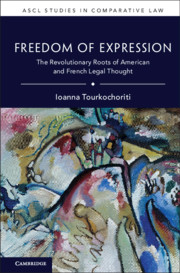Book contents
- Freedom of Expression
- ASCL Studies in Comparative Law
- Freedom of Expression
- Copyright page
- Contents
- Acknowledgments
- 1 Introduction
- 2 Antiquity, Modernity, and Historical Imaginaries on the Role of the Government
- 3 The Underlying Ex Ante Understanding of Liberty
- 4 The Moralizing Rational Republic versus the State Arbitrator of the Free Play of Interests
- 5 Foundation of the Rights of Man on the Rights of the Citizen versus Foundation of the Rights of the Citizen on the Rights of Man
- 6 Conclusion
- Bibliography
- Index
3 - The Underlying Ex Ante Understanding of Liberty
Published online by Cambridge University Press: 29 October 2021
- Freedom of Expression
- ASCL Studies in Comparative Law
- Freedom of Expression
- Copyright page
- Contents
- Acknowledgments
- 1 Introduction
- 2 Antiquity, Modernity, and Historical Imaginaries on the Role of the Government
- 3 The Underlying Ex Ante Understanding of Liberty
- 4 The Moralizing Rational Republic versus the State Arbitrator of the Free Play of Interests
- 5 Foundation of the Rights of Man on the Rights of the Citizen versus Foundation of the Rights of the Citizen on the Rights of Man
- 6 Conclusion
- Bibliography
- Index
Summary
This chapter discusses the difference in the understanding of liberty in France and the United States. In the United States, freedom of expression is protected in the negative sense. In France, some of its positive aspects are protected too. The French revolutionaries understood liberty in a metaphysical and universal sense, encompassing all three meanings of liberty as political, negative, and positive (what later became the rights of the welfare state). French revolutionaries were concerned by the need to guarantee the necessary preconditions for the exercise of liberty, whereas the American revolutionaries were pragmatists. The French Revolution brought about a reconceptualization of the role of the government, whereas the American Revolution led to a definition of the limits of the role of the government. In France, the state guarantees that the distinction between formal liberty and real liberty does not exist. In the United States, the state is not generally seen as having this mission. When it became legitimate for the state to intervene in the economic sphere, freedom of expression became the symbol of American distrust toward the government.
Keywords
- Type
- Chapter
- Information
- Freedom of ExpressionThe Revolutionary Roots of American and French Legal Thought, pp. 80 - 139Publisher: Cambridge University PressPrint publication year: 2021



